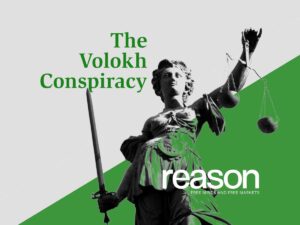[ad_1]
At a rally in Wilkes-Barre, Pa., President Trump mentioned this:
[H]ow brave had been our justices of the USA Supreme Court docket? What they did—they’re saving our nation. They’re really saving our nation….
And I simply have such respect for the job they’ve achieved towards—and, you recognize, the novel left performs the ref. You already know the nice Bobby Knight? He supported me. He used to battle with the referees on a regular basis. Scream at him, “Bobby, Bobby, please, do not do this.” It is not going to work. He mentioned, “You are proper. It is not going to work now.” It will work for the subsequent one. And the subsequent name, there’d be a flagrant foul, and so they would not name it. They did not wish to get screamed at.
The novel left harasses our judges and harasses our justices. They scream at them. They name them names. They are saying they’re incompetent, they’re horrible, they’re this, they’re that, they need to be impeached. They’re continuously saying they need to be impeached. However they’re screaming. And you recognize what? It has an impact on some individuals.
However up to now, they have been very sturdy. It is actually horrible. I imagine it is unlawful what they do. And it is a—I am attempting to present you issues that you’ve got by no means heard earlier than, and that is true. I imagine they’re taking part in the ref. They’re continuously criticizing our nice—a few of our best justices and a variety of nice judges.
You already know, I stored listening to a lot concerning the Florida case as a result of, you recognize, they weaponized our system, our authorities, completely weaponized. The primary time it is ever occurred. And so they mentioned, “My greatest case is in Florida, Florida, Florida.” And we had a really sensible—I do not know the choose—however a good and really sensible choose who took large abuse. It could have been really easy for her to only rule towards me. However she did not do this.
She dominated for—she threw out the entire case. It was thrown out. That was a giant case. And I’ve such respect for her—— as a result of she is, the truth is, sensible. However they had been hitting her so onerous. She’s going too gradual. She’s that. She needs to be eliminated instantly from workplace.
These individuals are horrible. I actually assume—I actually assume it is unlawful what they do with judges and justices. They’re taking part in the ref no completely different than Bobby Knight….
[W]e cannot let these radical left thugs continuously scream at our judges and say, we will impeach him, we will take him out of workplace, or her. We will do horrible issues to him. Steady—once you heard Schumer stand up on the steps of the courthouse, Supreme Court docket, and discuss, “Kavanaugh, we will get you, Kavanaugh. We will hit you,” or regardless of the hell he mentioned. If a mobster mentioned that, they’d be put in jail instantly. He, frankly, ought to have been put in jail or definitely spoken to very strongly….
Now there’s so much occurring right here:
[1.] Clearly, merely “criticizing” judges is constitutionally protected beneath trendy First Modification regulation (happily for Trump, who has proven little hesitation in criticizing judges). That wasn’t all the time so: Throughout a lot of American historical past, judges punished individuals for “contempt of courtroom” for his or her public statements that had been seen as aimed toward influencing courtroom choices. However within the mid-1900s, the Court docket made clear that such statements could not be punished, at the very least until they concerned threats of violence and the like (see, e.g., Bridges v. California (1941)).
[2.] Equally clearly, threats of prison assault aimed toward influencing judges—if a mobster did say “we will get you,” which might doubtless be construed as involving bodily “getting” fairly than simply political—will be punished, with no First Modification downside.
[3.] Public requires impeachment, by bizarre residents, are additionally constitutionally protected, as a result of they’re calls for presidency motion.
[4.] However this is essentially the most fascinating query: Might threats of impeachment by legislators or legislative leaders be criminally punished when they’re aimed toward influencing the judges’ future votes? I feel the reply is certainly “no,” however the path to that reply is an fascinating one—and it goes via a case involving, of all individuals, Trump’s former Secretary of Vitality, Rick Perry.
Let’s step again a bit, and observe why that is an fascinating query. Say that an employer threatens staff that he’ll hearth them in the event that they vote in methods the employer disapproves of. Such threats (and such firing itself) are unlawful in all states, and certainly a criminal offense in lots of.
Likewise, say that an employer threatens an worker, who can be a part-time elected metropolis council member, with firing if the worker votes on town council in methods the employer disapproves of. I feel lots of the state statutes that bar firing staff based mostly on their political exercise would outlaw that, and constitutionally so. See additionally Wyo. Stats. § 22-26-116, which expressly forbids an employer’s utilizing employment actions “making an attempt to regulate such worker’s vote on any query at any public election, or in any public place or board or in any workplace to which such worker could also be appointed or elected.”
Or say that an employer threatens an worker with being fired if the worker votes in a selected method whereas on a jury—or if the worker is a part-time choose, and renders a selected resolution as a choose. I feel that too will be criminalized, and might be already prison obstruction of justice or juror intimidation in lots of jurisdictions. (Certainly, many states expressly bar employers from utilizing the specter of firing and comparable threats to maintain an worker from serving as a juror; federal regulation does the identical with regard to service as a juror in federal circumstances. Absolutely employers can equally be barred from utilizing such threats to affect the worker’s vote as a juror.)
Neither is this restricted to threats to do one thing unlawful: If somebody threatens a juror or a choose with disclosure of some embarrassing secret (e.g., an affair) if the juror or choose votes a selected method, that might be criminally punishable blackmail (to oversimplify barely). Certainly, providing somebody a job to induce him to vote a selected method as a choose or juror can be prison bribery. Threatening to eject somebody from a job to induce him to vote a selected method as a choose or juror may very well be criminally punishable, too.
Nicely, one may say, members of Congress threatening a choose with impeachment are identical to employers threatening certainly one of their worker who’s a choose with being fired. Why then cannot that be outlawed? For a solution, we are able to take a look at Ex parte Rick Perry, a 2016 case from Texas’s excessive courtroom for prison issues. (Disclosure: I argued on behalf of amici within the case.)
In that case, Perry was prosecuted as a result of, whereas governor, he threatened to veto (and did veto) a selected appropriation if an Austin DA, Rosemary Lehmberg, refused to resign. Lehmberg had pleaded responsible to drunk driving, so Perry argued that she was unfit for workplace; however Perry’s critics argued that Perry’s actual motivation was that Lehmberg had been prosecuting his political allies. In any occasion, Perry was prosecuted on the idea that he had “deliberately or knowingly influenced or tried to affect … Lehmberg … within the particular efficiency of her official responsibility, to-wit: the responsibility to proceed to hold out her duties because the elected District Lawyer.” The related statute said, in impact,
An individual commits an offense if via a risk, nevertheless communicated, to take or withhold motion as a public servant, he influences or makes an attempt to affect a public servant in a particular efficiency of his official responsibility.
On its face, the statute utilized to Perry’s threatened veto. And the statute would additionally certainly punish a legislator for expressly or implicitly threatening to question a choose if the choose votes a selected method—”a risk … to take … motion as a public servant” that “makes an attempt to affect a public servant [the judge] in a particular efficiency of his [the judge’s] official responsibility.”
However that may’t be proper, I feel (see this amicus transient that I had co-filed within the case, along with Prerak Shah and then-lawyer Jim Ho, and see additionally this submit). And the Texas courtroom agreed, holding that the statute was unconstitutionally overbroad:
[P]ublic servants have a First Modification proper to interact in expression, even threats, concerning their official duties…. [T]he indisputable fact that speech is coercive doesn’t, alone, imply that it may possibly legitimately be proscribed: “[s]peech doesn’t lose its protected character … just because it might embarrass others or coerce them into motion.” And political logrolling—which includes the swap of 1 licensed official act for one more—”has by no means earlier than been condemned as extortion.” …
Unconstitutional Purposes Are Many
As now we have defined, public servants have a First Modification proper to interact in expression, even threats, concerning their official duties…. [Yet under this statute, m]any threats that these public servants make as a part of the conventional functioning of presidency are criminalized:
- a risk by the governor to veto a invoice until it’s amended,
- a risk by the governor to veto a invoice until a special invoice he favors can be handed,
- a risk by the governor to make use of his veto energy to wield “the funds hammer” over a state company to pressure needed enhancements,
- a risk by the comptroller to refuse to certify the funds until a funds shortfall is eradicated,
- a risk by the lawyer common to file a lawsuit if a authorities official or entity proceeds with an undesired motion or coverage,
- a risk by a public defender to file, proceed with, or enchantment a ruling on a movement to suppress until a positive plea settlement is reached,
- [a] risk by a trial choose to quash an indictment until it’s amended.
I feel the identical reasoning applies even to an express risk (“Vote to uphold this regulation, or we are going to impeach you”), and definitely to an implicit risk that tries to “work the refs.” Members of Congress have the constitutional energy to decide on to question a choose. Below longstanding American authorized custom, they don’t train that energy based mostly simply on the choose’s choices, however they could break with custom, and should threaten to interrupt with that custom. The safety towards such impeachments is political (each the requirement of two/3 vote within the Senate to take away a choose, and the doable voter pushback towards a celebration that’s seen as attempting to affect the courts this manner), not judicial. Likewise, the safety towards threats of such impeachments comes from the integrity of the judges and the potential for voter retaliation towards the politicians, not from the potential of prison punishment for the specter of impeachment.
The identical after all applies to different conditions. An employer’s telling an worker who’s a part-time metropolis council member “Stop town council, or I am going to hearth you” could also be criminalized. But when a Vice-President and a number of other Cupboard officers inform the sitting President, “Resign, or we’ll invoke the Twenty-Fifth Modification to pressure you to step apart,” that may’t be made a criminal offense. And the record might go on, because the Perry opinion suggests.
To make certain, I ought to acknowledge that among the strains right here will be hazy. What constitutes punishable blackmail and what’s protected speech, as an illustration, is famously difficult to determine. Even the definition of bribery will be fairly obscure across the edges. And, as I famous, bizarre employers typically could not attempting to affect their employee-judges with the specter of firing. However I feel it is fairly clear, as Ex parte Perry concludes, that authorities officers have broad latitude to threaten official motion with a view to strain different authorities officers—and that might apply, I feel, to threatening impeachment.
[ad_2]





